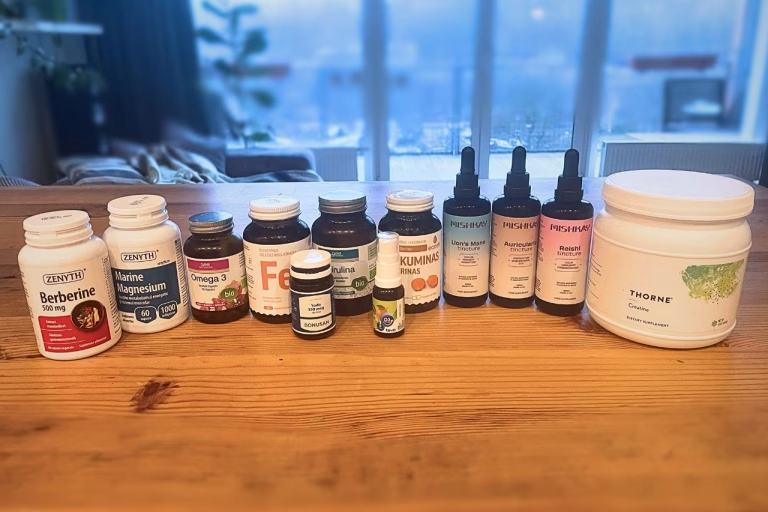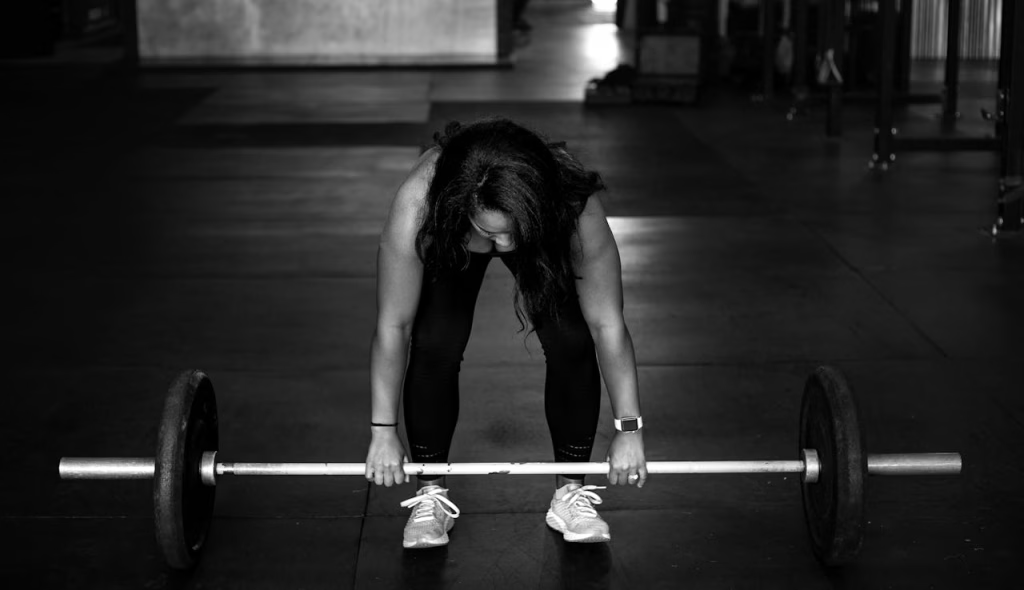Turning 40 is a milestone that’s inspired me to reassess my health and current routines. As I navigate the changes that come with age, I’ve made key adjustments to support my physical, mental, and emotional well-being. From nutrition and exercise to self-care and sleep, here are the changes I’m embracing in 2025 to thrive in this new and exciting chapter of life.
This list will help you reflect and focus on what you want to improve.
I want to mention what I have been doing since last year briefly and will continue in 2025.
I continue to:
- Cook most of my meals at home, so I know exactly all the ingredients that go into my dishes.
- Spend more time in nature
- Stay active as much as I can and try to move daily.
- Drink at least 2 liters of water daily to ensure I am hydrated.
- Eat mainly a whole food plant-based diet.
There are more points I could mention, but now, let’s move on to what I will change this year.
1. Increase Protein Intake
Last year, I learned much about nutrition, completed two nutrition certification courses, and experimented with my diet. Instead of focusing on macros, I concentrate on nutritious whole foods.
Protein is crucial for preserving muscle and bone health, especially as we age (1)(2). I now aim for 60–90 grams of high-quality plant-based protein daily, spread across my meals. This includes adding protein powders, experimenting with recipes, and prioritizing foods rich in protein like lentils, tofu, and beans.
2. Shift My Eating Schedule
I love exercising while fasting, especially when going for a run, but recently, I have learned, mostly from watching podcasts with Dr. Stacy Sims, that this is not a great way to exercise for women as you burn through your lean mass. I now eat a small pre-workout snack, such as a banana with nut butter or a protein shake, to fuel my sessions without burning through muscle.
I used to skip breakfast and have my first meal at around 12-1 pm, but this meant my dinner used to be way too close to bedtime. I now try to have breakfast or at least some food as soon as I wake up, lunch around 1 PM, and dinner around 7 or 8, and don’t snack after the last meal.
Just as I’ve restructured my meals, I’m also reevaluating my exercise routine to support my body better.
3. Increase Strength Training
I usually exercise 5-6 times a week and walk a lot. Last year, I focused a lot on cardio, especially on running, as I traveled a lot, and running was a great way to exercise no matter where I was. I also love yoga and pilates, so most of my exercise last year was running and yoga or pilates, with a few weight sessions at the gym or some resistance band exercises at home. Being 40 and understanding the importance of maintaining muscle as we age, I focus on weight and strength training with occasional yoga and cardio sessions. I am still not quite ready to lift heavy weights in the gym, so I am building towards it by joining strength and weight training classes and slowly increasing my weights.
4. Prioritize Sleep
Since getting a Whoop band, I realized how important sleep is for overall health. I had no idea how bad alcohol and eating late were for my sleep.
I’ve shifted my bedtime from 12 pm to 11 pm and now avoid eating, phone use, or work in the hours leading up to sleep. I also practice a simple breathing exercise for 10 minutes or so before bed as it increases my REM sleep significantly.
My newly discovered technique to improve my sleep is mouth taping. As I am a mouth breather, my REM sleep improved significantly since starting practising it.
These small adjustments have helped me wake up feeling more rested and energized for the day ahead.
5. Optimize My Supplement Intake
In an ideal world, we would obtain all the necessary nutrition from the whole foods we eat. Unfortunately, we can’t get our hands on the freshest organic foods all year round, especially in the wintertime in Europe.
I like to give my immune system a bit more of a boost in the cold time of the year.
Here are a few of my supplements, some I take daily, some when I need them the most:
Immune Support: Vitamin D, Spirulina, Reishi mushrooms, and Curcumin
Cognitive Health: Lion’s Mane, Shilajit, Magnesium, Creatine.
Cholesterol management: Berberine, Auricularia mushroom,
Please note that these supplements work for me and my specific needs. Always consult a healthcare provider to find what works best for your needs.
If you want to learn more about the best supplements for perimenopause symptoms, read:
Best Perimenopause Supplements That Are Backed by Research

7. Minimize Alcohol
Reading more and more research about the adverse effects of alcohol, from cancers to liver disease (3)(4)(5)(6), as well as seeing my Whoop readings after having even one glass of wine, I am more and more conscious about consuming alcohol. I am not saying that I will be completely sober, but I am more than happy not to have alcohol for a month or even two and only have a glass of wine on a special occasion.
Three-day hangovers and all the risks that come with alcohol are just not worth it anymore.
8. Focus On Good Posture
After three years as a digital nomad without an ergonomic workplace, my posture suffered. Now that I’m settled, I’ve invested in an ergonomic chair and a laptop stand to align my screen at eye level and support my back. I’ve also incorporated daily posture and mobility exercises and regular massages to address back and neck pain.
10. Add More Self-Care
From meditation and breathing exercises to slow mornings and beauty treatments. I am treating myself to a massage or a physio 2 to 4 times a month, depending on my needs. I have also discovered a new passion for saunas and love to spend half an hour in a sauna once a week.
Small acts of self-love compound into great things in our lives.
11. Practicing gratitude Daily
I am not new to a gratitude practice, but this year, I am focusing on things I am grateful for and not complaining about things I can’t change, like the weather or age. I am very focused on achieving rather than complaining.
If you want to join me, you can follow us on Instagram, where we have launched a daily gratitude challenge.
You can also learn about the benefits of gratitude in my article: Why Gratitude Works: The Benefits and How to Practice It Daily.
12.Avoid Harsh Chemicals
This year, I am focusing on products for my skin and personal care, cleaning products, food, and supplements without any harmful chemicals, and embracing natural products. I don’t buy the product if the ingredients do not benefit my body.
It also extends to my environment, from installing water and air filters to clearing out the kitchen and bathroom of unnecessary plastics or toxic chemicals.
To help me choose the cleanest products, I use tools like Yuka App and Informed.
You can also read my article:
Taking care of your health doesn’t have to be overwhelming, it’s about making small, intentional changes that add up over time. I hope my routine inspires you to reflect on your own goals for the year ahead.
What steps are you taking to prioritize your well-being in 2026? Share your thoughts in the comments. Let’s inspire each other. I’d love to hear from you!
References to studies
- Rizzoli, R., Stevenson, J., Bauer, J., Van Loon, L., Walrand, S., Kanis, J., Cooper, C., Brandi, M., Díez-Pérez, A., & Reginster, J. (2014). The role of dietary protein and vitamin D in maintaining musculoskeletal health in postmenopausal women: a consensus statement from the European Society for Clinical and Economic Aspects of Osteoporosis and Osteoarthritis (ESCEO).. Maturitas, 79 1, 122-32 . https://doi.org/10.1016/j.maturitas.2014.07.005.
- Nilsson, A., Rojas, D., & Kadi, F. (2018). Impact of Meeting Different Guidelines for Protein Intake on Muscle Mass and Physical Function in Physically Active Older Women. Nutrients, 10. https://doi.org/10.3390/nu10091156.
- Pflaum, T., Hausler, T., Baumung, C., Ackermann, S., Kuballa, T., Rehm, J., & Lachenmeier, D. (2016). Carcinogenic compounds in alcoholic beverages: an update. Archives of Toxicology, 90, 2349 – 2367. https://doi.org/10.1007/s00204-016-1770-3.
- Rumgay, H., Murphy, N., Ferrari, P., & Soerjomataram, I. (2021). Alcohol and Cancer: Epidemiology and Biological Mechanisms. Nutrients, 13. https://doi.org/10.3390/nu13093173.
- Scheideler, J., & Klein, W. (2018). Awareness of the Link between Alcohol Consumption and Cancer across the World: A Review. Cancer Epidemiology, Biomarkers & Prevention, 27, 429 – 437. https://doi.org/10.1158/1055-9965.EPI-17-0645.
- Jacob, R., Prince, D., Kench, C., & Liu, K. (2023). Alcohol and its associated liver carcinogenesis. Journal of Gastroenterology and Hepatology, 38, 1211 – 1217. https://doi.org/10.1111/jgh.16248.
Silvija Meilunaite, PN1-NC, CSMC, is a certified nutrition and menopause coaching specialist who writes about midlife health, nutrition, and evidence-based wellness. She focuses on research-driven approaches to feeling better in your 40s and beyond, with a special interest in low-tox living and supportive daily habits.



